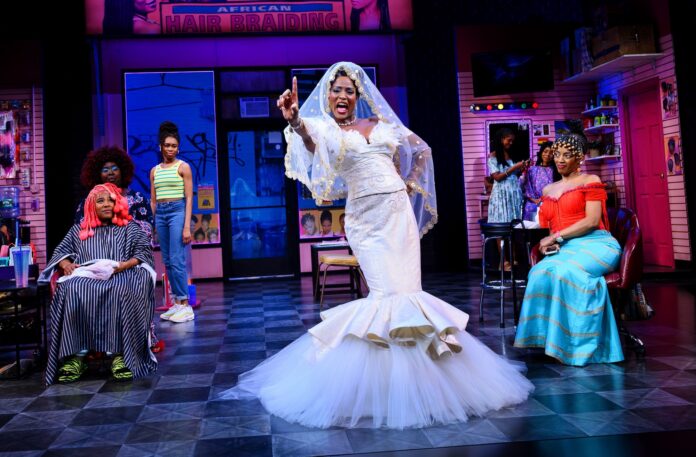This is Drama Masks, a Bay Area performing arts column (full of mad ramblings, Oxford commas, and “theatre” with an “r-e”) from a born San Franciscan and longtime theatre artist in an N95 mask. I talk venue safety and dramatic substance, or the lack thereof.
It’s amazing how the world at large will give a theatre’s seasonal programming a new (often unwanted) context. Seasons are planned months in advance, but as the saying goes, “Life’s what happens when you’re busy making plans.” SF Opera was proud to start 2022 with Eugene Onegin by Tchaikovsky (Russian), but didn’t expect to be met with pro-Ukrainian protesters outside the Opera House. Berkeley Rep’s 2016 production of It Can’t Happen Here was a lark that practically predicted the election that followed. And yes, it’s hard to watch plays about death after what happened earlier this month. One imagines the ADs of those companies rethinking their choices, had they been gifted hindsight.
Nevertheless, some of the best theatre I’ve seen this year came from companies whose season choices have aged like ripening fruit. Golden Thread dedicated their entire season to Gaza, the topic neither major party addressed during the election. La Lengua’s Puerto Rico season seemed to predictively counter comments made during the election. It reveals which theatre companies take responsibility for their work. Art isn’t created in a vacuum and there’s no such thing as a truly apolitical work, just the (lack of) awareness.
The latter two companies stuck to their messages and purposely tried to amplify silenced voices. That they so well coincided with recent events is less precognition so much as addressing problems that still haven’t been fixed. I’m sure SF Mime Troupe would have preferred this year’s summer show not feel like a future headline, but that’s what happened because problems aren’t being addressed.
That’s what makes art timeless, regardless of its setting or production time. In the months and years to come, it’ll be interesting to see how many artists and institutions take the MSNBC route, sacrificing their ethics to not piss off the powers that be. (I have local some predictions.) I’ll also welcome the ones who take bold stands with limited resources to speak for the have-nots. Those are the ones whose work you’ll want to see out and celebrate. Those are the ones whose we need. Not another goddamn production of Grease.
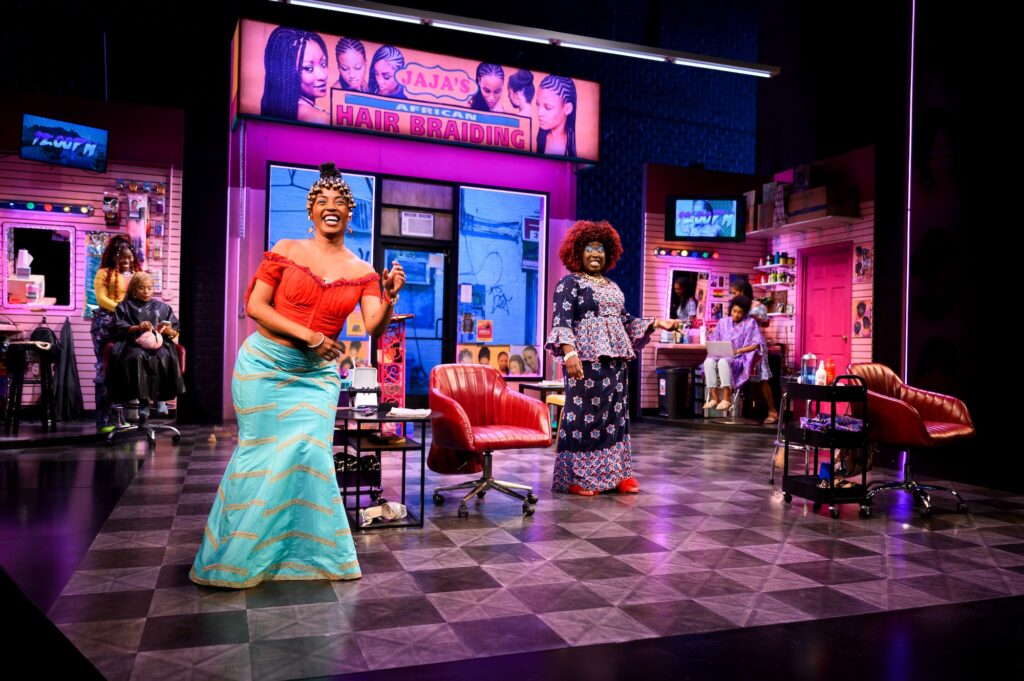
JAJA’S AFRICAN HAIR BRAIDING AT BERKELEY REP
You wanna talk timely theatre shows, it hardly gets more so than Jaja’s African Hair Braiding (West Coast premiere through December 15 at Berkeley Rep). The year-old play is set in the previous Trump term of 2019, but takes a twist that many fear could happen again sometime soon.
But that’s after playwright Jocelyn Bioh drops us into the African-Harlemite equivalent to Steel Magnolias. The titular beauty parlor is bustling on a blazing hot summer. Although its namesake Senegali owner has yet to appear—it’s her wedding day, after all—her Americanized daughter Marie (Jordan Rice) does her best to maintain order among the all-African staff and the obnoxious American clientele. And so, our plotless story finds us watching colleagues accuse one another of stealing customers, bootleggers slink in-and-out trying to hustle hot wares, and the employees feel their tensions rise with the thermostat. All of it is hilarious.
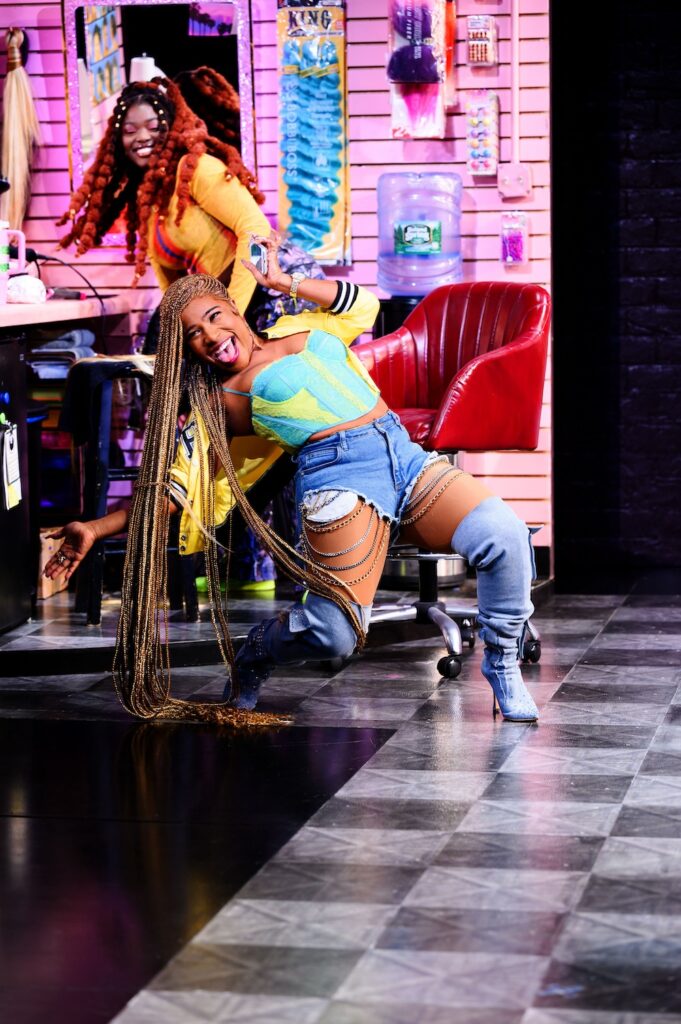
A noticeable African audience showed up for opening night, adding welcome, lively reactions to the goings-on that the mostly older/mostly white audience clearly didn’t expect. Yet, it’s what made this familiar but unique immigrant story feel fresh. It allows the actors to play big enough to command attention without sacrificing dignity. Even if the final minutes weren’t so timely, the story’s vitality lies with an electric cast who seem to love their characters as much as the characters love one another. In a time of uncertainty, that love is needed, onstage and off.
I was also happy to not be the only one masked on opening night, though it was still only a handful. (Masks will be required on Sunday shows through November 24.) The Rep’s HVAC in the Peet’s Theatre held up pretty well, with CO² readings on my Aranet4 peaking at about 1,191ppm during the two-act show.
JAJA’S AFRICAN HAIR BRAIDING’s West Coast premiere runs through December 15 at the Berkeley Rep. Tickets and further info here.
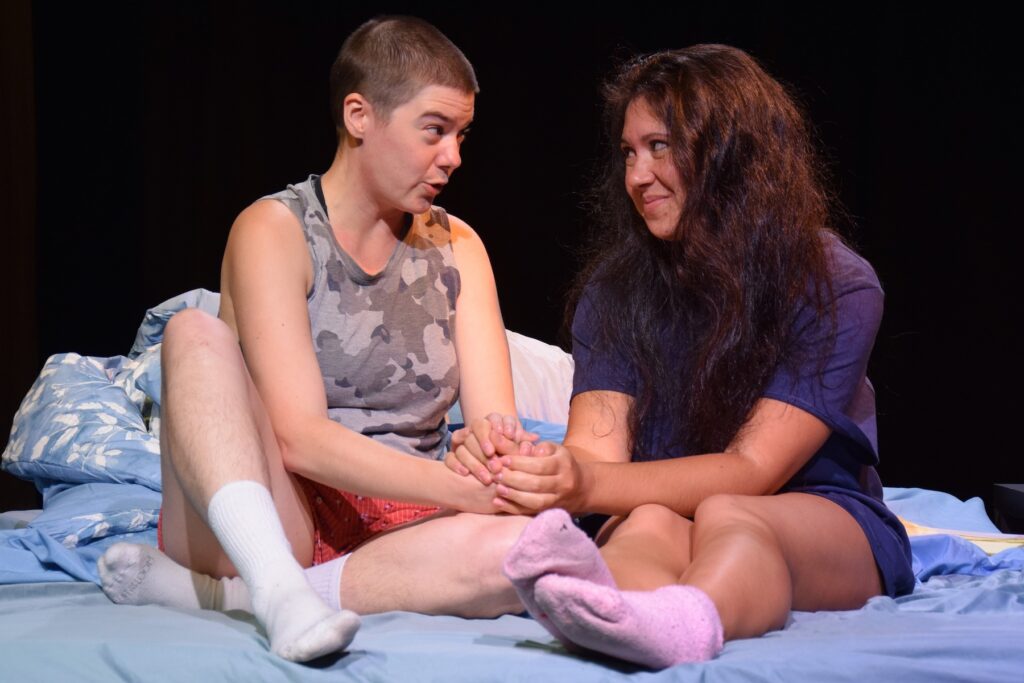
FOUND FAMILY BY LEFT COAST THEATRE COMPANY
It’s crazy to think I first met Neil Higgins 14 years ago. We both frequented the same Café Royale-based theatre collective (later relocated to PianoFight) that attracted many of SF’s up-and-coming indie theatre artists. Knowing Higgins’ work before he was Left Coast Theatre Company’s artistic director, I can say with confidence that “The Interview”—his show-opening contribution to the Found Family short play collection (through December 7 at the Phoenix Theatre, SF)—may be the best thing he’s ever written. It’s a funny, well-acted, too-real satire of both queer dating and attempting adult friendships in an increasingly digital world. What’s more, it’s just the opening piece of LCTC’s best show this season.
The six short plays assembled here, cast with LCTC regulars and newbies alike, leans more on laughs (Kristy Lin Billuni’s “Maybe, Baby” is a particularly hilarious send-up of lesbian couplings and an over-reliance on PC-appropriate terminology), but is deeply rooting in sincerity regarding the importance of the “found family” to queer identity. Those of us Gen-X and older recall being terrified at being outed to the family that bore us, which made finding sympathetic allies a literal lifeline for us.
The plays of Found Family will occasionally make “generation gap” jokes about “the kids these days” (particularly, Michael Conner’s “Who Even Drives?”), but a piece like Duncan Pflaster’s modern-set “Soldier Boi” may resonate even deeper for those of us who still remember the days of “Don’t Ask, Don’t Tell.” These plays hilariously document how a queer person’s need for family, found or not, hasn’t diminished; it’s just evolved.
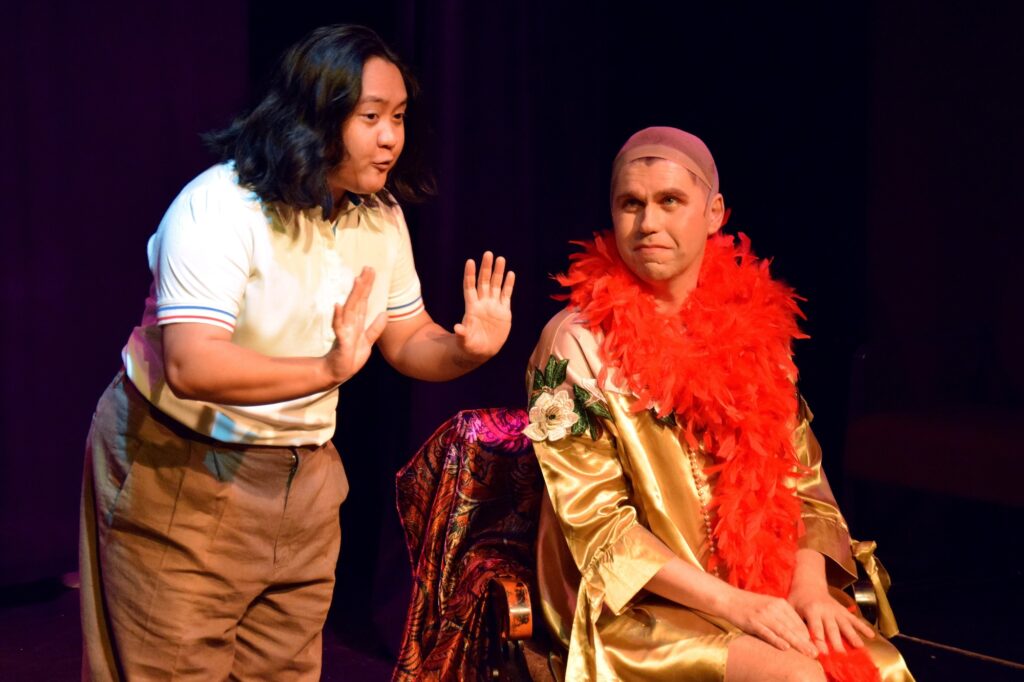
(One hopes that message lingered with the grade-school-aged kid who attended opening night with, one assumes, their mother. The little one certainly had interesting reactions to all the blue language from the characters.)
The HVAC of the Native Sons Building has always been a curious contradiction to the updated restrooms and elevators. One is always grateful that the latter two are supported and maintained, but the flow of air continues to lag behind. To sit in the Phoenix Theatre for two acts and two hours was to watch the CO² readings on my Aranet4 creep ever high, peaking around 2,967ppm by the end of the show.
Still, if you’re well-masked (as always, I was in my Flo Mask) and want reassurance of the power of queer family as we enter another goddamned Trump era, this show will probably comfort you more than the folks you might have to see this Thanksgiving.
FOUND FAMILY runs through December 7 (no performances Thanksgiving weekend) at the Phoenix Theatre, SF. Tickets and further info here.
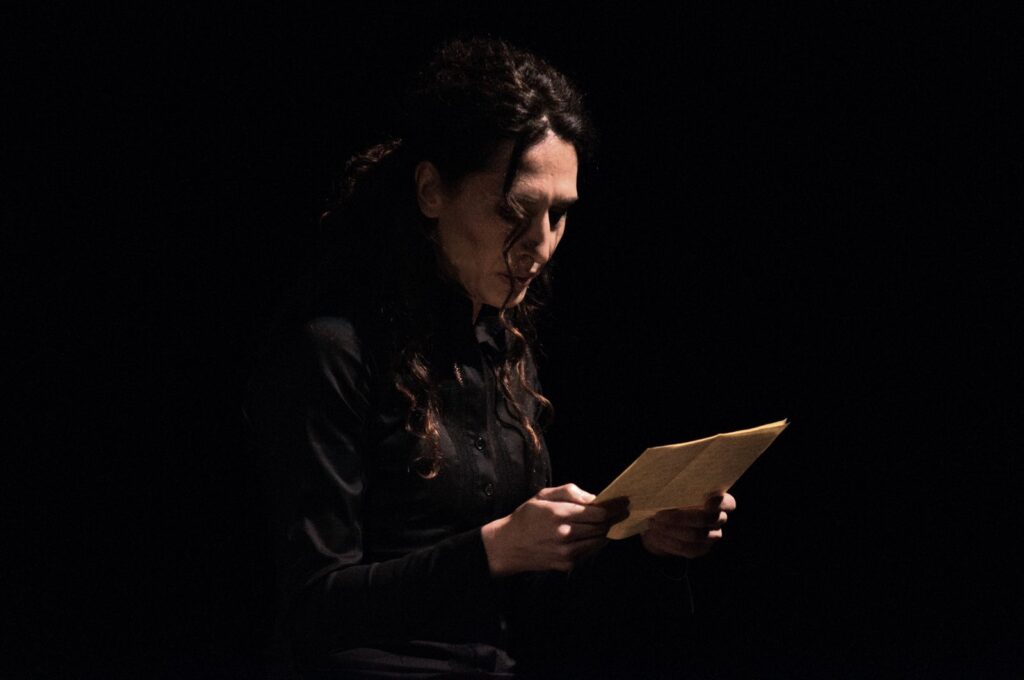
LETTERE D’AMORE (LETTERS OF LOVE) AT THE MARSH-SF
When I say that Francesca Fanti’s Lettere D’Amore (Letters of Love), through December 15 at The Marsh-SF, is “old-fashioned,” I mean that in both the best and worst way. Though a true story, its premise of a woman (Fanti, who also directed) discovering her late mother’s affair through old love letters is a literary trope more than a century old: It endures because it intrigues. In fact, the most fascinating moments of the play are our narrator trying to match the loving (and sexual) woman written to in the letters with the cold, harsh, unforgiving woman who raised her. It forces everyone watching to ponder how well we really know the people we’ve probably known our entire lives.
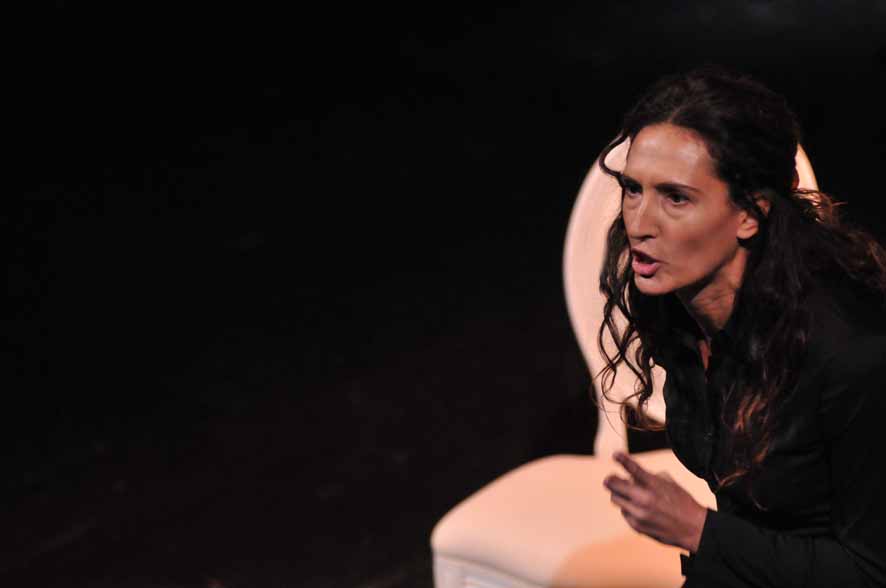
Yet, the play is performed in such an overly-expository way that it occasionally feels as if it’s dumbing itself down. The structure of every scene (written by Dacia Maraini, based on the real letters of Gabriele d’Annunzio) has our narrator read the letter in a sort of monotone, then make an impassioned plea to her late mother for answers, then do the same thing over and over again. It becomes redundant very quickly, with the 90-or-so-minute runtime seeming much longer. Perhaps if Fanti had handed one of her tasks (either director or performer) off to someone else, it would have given the show an objective vantage point that would have varied up the performance. As it stands, the story is an interesting idea stuck on an endless loop.
The opening night audience was maybe ¾ full on opening night. Few were masks, but it seems that the SF Marsh HVAC (which can be all over the place) was doing a good job that night, with CO² readings peaking at 804ppm on my Aranet4 by the end of the show.
LETTERE D’AMORE (LETTERS OF LOVE) runs through December 15 at The Marsh-SF. Tickets and further info here.

